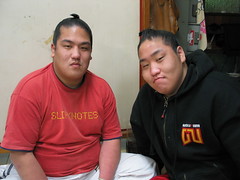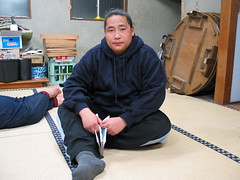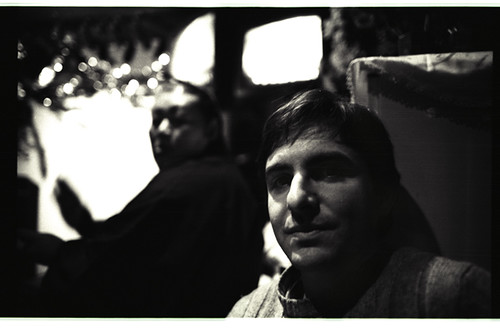Stablemates I
HIROKI AND TATSUYA, THE TAKEMURA BROTHERS

Aside from the few months he spent as a mediocre judo wrestler in middle school, Hiroki never really played sports, he said. But his grades were never great: he'd had to go to summer school for math and science in order to graduate from middle school and just a couple months into his first year of high school, he was already in danger of failing it. Not even the grades in his language, literature and history classes, the only ones he enjoyed, were enough to bump up his average. And he was a big guy, pushing 6 feet and weighing almost 240 pounds even before he started bulking up at the stable.
His gym teacher back in Hyogo prefecture, near Osaka, was a member of the Oyakata's network of friends and supporters, whom he draws on for news of potential new recruits. One day the teacher asked him if he'd like to become a sumo wrestler. He'd never thought about being a wrestler himself, but he liked the sport enough, he supposed. "Why not just give it a shot?" his teacher suggested, and he figured he might as well.
His father—a carpenter who worked on construction sites—and mother were against the idea. He was 16 and they didn’t want him dropping out of school and leaving home. But he joined with his grandfather, a die-hard sumo fan, to convince his parents to let him join the stable.
Now 23, he seems ambivalent about the course he took. Practicing each morning is rough on him and the tournaments take enormous levels of motivation. Winning feels great, he told me. "But losing is awful," he said. "You might be up against some huge guy and he'll just slam you onto the floor."
Sumo life hasn't treated him so kindly. After seven years in the stable, he's still stuck at jonidan rank, the second lowest. "I just want to advance," he said. He'd have to win five of the seven matches in which he'll compete this month in order to advance up to the next level, sandanme. At sandanme, he'd be allowed to wear soft sandals, keep his robe closed with a more colorful scarf, and put on a jacket when he goes outside in the winter. He'd also have a shot at moving upstairs to the smaller room I've been sharing with the highly ranked wrestlers. But he's doubtful that he can win enough matches.
His long-term plans are fuzzier than his short-term goal of mere advancement. He didn't think much about the implications of leaving school until he'd turned 20 or so, when he first started considering what he might do once he leaves sumo. He'd worked construction during school vacations while he was younger and figured he could always do that once he left the sport. "There's not much you can do in Japan without an education, but you can do carpentry or other work with your hands," he told me. "Although there's not a lot of that kind of work out there now, and even when you can get it, it doesn't pay all that well."
His dream is to open a pub; he told me he'd like to go to cooking school after he leaves the stable. He said the Oyakata's told him that cooking for his fellow wrestlers in the stable is the same thing as going to cooking school. But Hiroki doesn't seem entirely convinced. "Sure, you learn the techniques," he said. "But you don't learn much about food."
Tatsuya, meanwhile, disliked studying so much that he didn't even mess around with high school, following his brother instead to the stable. He started considering becoming a wrestler when he was in middle school, where he practiced judo for three years. He remembered seeing his brother come home during his first vacations from the stable, with his bruised face and permanently misshapen ear that another wrestlers' head collided into, and thinking, "This is nothing I'd ever want to do."
Then one weekend, Tatsuya visited his brother in Tokyo and stayed at the stable, where he watched the wrestlers practice each morning. "It was scary at first," he told me. "Then I started wanting to do it." He decided to join the stable once he graduated middle school, and immediately ceased to do any of his schoolwork. He entered in March of 2003, when he was 15.
At first he was perpetually exhausted from the training, cleaning and cooking he constantly had to do, and he suffered from homesickness. He missed the friends he used to play basketball and shoot pool with. He missed the girls he used to take out to the empty fields around his town to shoot off fireworks at night. "It makes for a nice atmosphere," he counseled me. "Girls like it."
But soon he started liking it at the stable. He liked being able to kick back in the evening with a comic book or a CD and relax, knowing he had nothing to worry about until practice the next morning. He liked having people around to talk to.
He had no personal expenses and was making a little bit of money. It wasn't enough to save anything: just the $700 and change someone at his rank, jonidan, gets every other month after a tournament. But it was enough for him to buy a minidisk player and a Gameboy, a few CDs and all the snacks he wanted from the convenience store. "I'm a sumo wrestler," he said. "I eat a lot."
Still, he often grew weary of the trash talking from his stablemates and the lack of privacy. And sometimes he feels like he just can't be bothered to join the daily cleaning brigade. "I'm not a team player," he confessed to me.
BATTUSHIG YAGAANBAATAR, AKA BATTO, AKA WAKATORA

A couple years ago, back in Mongolia, Batto, as he's known at the stable, saw a story on a television news broadcast about a sumo recruiter from Japan who was in his country seeking new wrestlers. The popularity of Japanese sumo was just hitting its peak in Mongolia: Asashoryu had just reached yokozuna rank and was a national hero in his home country.
Batto's father, an automobile importer who had done a type of Mongolian wrestling similar to sumo, suggested he go to Japan and take a crack at being a sumo wrestler. Batto already had one brother in Japan, who lived outside of Tokyo and sold cell phones, and two more older brothers going to college in England.
Batto and his family tracked down the recruiter who'd appeared on the news and went out to meet him. He was eventually chosen as one of the five main contenders for placement in the Oyakata's stable and after a series of medical checkups and physical fitness tests, he came out on top.
Batto, now 18, joined the stable in May of 2003, not knowing any Japanese at all. Byabhjav, the Mongolian wrestler from another stable, whom I saw fight the Sekitori, stopped by frequently to show him the ropes and give him some pointers on how to behave at the stable. He calls that wrestler his "senpai," a term Japanese use for their upperclassmen and seniors. It implies a level of respect and devotion.
At first, Batto hated living in a country where he couldn't speak the language. And he despised the food: fish was a rarity in his landlocked home country, much less raw fish. But with little opportunity to speak Mongolian, he soon picked up Japanese from the wrestlers in the stable and the food slowly grew on him. He still avoids sushi, but actually likes natto, the soybeans fermented into a sticky goo that some Japanese can't even stomach.
Everyone around the stable calls him Batto, a Japanized shortening of his full given name "Battushig." But when he competes, he—like all of the 61 foreigners in the sumo league—has to do so under an adopted Japanese name. His is "Wakatora."
I asked Batto how he felt about having to adopt a Japanese name and identity, affect Japanese mannerisms, and literally bow to Japanese gods. He didn't seem to mind.
"I just follow along and do what everyone else does," he said.
NEXT: Stablemates II

Aside from the few months he spent as a mediocre judo wrestler in middle school, Hiroki never really played sports, he said. But his grades were never great: he'd had to go to summer school for math and science in order to graduate from middle school and just a couple months into his first year of high school, he was already in danger of failing it. Not even the grades in his language, literature and history classes, the only ones he enjoyed, were enough to bump up his average. And he was a big guy, pushing 6 feet and weighing almost 240 pounds even before he started bulking up at the stable.
His gym teacher back in Hyogo prefecture, near Osaka, was a member of the Oyakata's network of friends and supporters, whom he draws on for news of potential new recruits. One day the teacher asked him if he'd like to become a sumo wrestler. He'd never thought about being a wrestler himself, but he liked the sport enough, he supposed. "Why not just give it a shot?" his teacher suggested, and he figured he might as well.
His father—a carpenter who worked on construction sites—and mother were against the idea. He was 16 and they didn’t want him dropping out of school and leaving home. But he joined with his grandfather, a die-hard sumo fan, to convince his parents to let him join the stable.
Now 23, he seems ambivalent about the course he took. Practicing each morning is rough on him and the tournaments take enormous levels of motivation. Winning feels great, he told me. "But losing is awful," he said. "You might be up against some huge guy and he'll just slam you onto the floor."
Sumo life hasn't treated him so kindly. After seven years in the stable, he's still stuck at jonidan rank, the second lowest. "I just want to advance," he said. He'd have to win five of the seven matches in which he'll compete this month in order to advance up to the next level, sandanme. At sandanme, he'd be allowed to wear soft sandals, keep his robe closed with a more colorful scarf, and put on a jacket when he goes outside in the winter. He'd also have a shot at moving upstairs to the smaller room I've been sharing with the highly ranked wrestlers. But he's doubtful that he can win enough matches.
His long-term plans are fuzzier than his short-term goal of mere advancement. He didn't think much about the implications of leaving school until he'd turned 20 or so, when he first started considering what he might do once he leaves sumo. He'd worked construction during school vacations while he was younger and figured he could always do that once he left the sport. "There's not much you can do in Japan without an education, but you can do carpentry or other work with your hands," he told me. "Although there's not a lot of that kind of work out there now, and even when you can get it, it doesn't pay all that well."
His dream is to open a pub; he told me he'd like to go to cooking school after he leaves the stable. He said the Oyakata's told him that cooking for his fellow wrestlers in the stable is the same thing as going to cooking school. But Hiroki doesn't seem entirely convinced. "Sure, you learn the techniques," he said. "But you don't learn much about food."
Tatsuya, meanwhile, disliked studying so much that he didn't even mess around with high school, following his brother instead to the stable. He started considering becoming a wrestler when he was in middle school, where he practiced judo for three years. He remembered seeing his brother come home during his first vacations from the stable, with his bruised face and permanently misshapen ear that another wrestlers' head collided into, and thinking, "This is nothing I'd ever want to do."
Then one weekend, Tatsuya visited his brother in Tokyo and stayed at the stable, where he watched the wrestlers practice each morning. "It was scary at first," he told me. "Then I started wanting to do it." He decided to join the stable once he graduated middle school, and immediately ceased to do any of his schoolwork. He entered in March of 2003, when he was 15.
At first he was perpetually exhausted from the training, cleaning and cooking he constantly had to do, and he suffered from homesickness. He missed the friends he used to play basketball and shoot pool with. He missed the girls he used to take out to the empty fields around his town to shoot off fireworks at night. "It makes for a nice atmosphere," he counseled me. "Girls like it."
But soon he started liking it at the stable. He liked being able to kick back in the evening with a comic book or a CD and relax, knowing he had nothing to worry about until practice the next morning. He liked having people around to talk to.
He had no personal expenses and was making a little bit of money. It wasn't enough to save anything: just the $700 and change someone at his rank, jonidan, gets every other month after a tournament. But it was enough for him to buy a minidisk player and a Gameboy, a few CDs and all the snacks he wanted from the convenience store. "I'm a sumo wrestler," he said. "I eat a lot."
Still, he often grew weary of the trash talking from his stablemates and the lack of privacy. And sometimes he feels like he just can't be bothered to join the daily cleaning brigade. "I'm not a team player," he confessed to me.
BATTUSHIG YAGAANBAATAR, AKA BATTO, AKA WAKATORA

A couple years ago, back in Mongolia, Batto, as he's known at the stable, saw a story on a television news broadcast about a sumo recruiter from Japan who was in his country seeking new wrestlers. The popularity of Japanese sumo was just hitting its peak in Mongolia: Asashoryu had just reached yokozuna rank and was a national hero in his home country.
Batto's father, an automobile importer who had done a type of Mongolian wrestling similar to sumo, suggested he go to Japan and take a crack at being a sumo wrestler. Batto already had one brother in Japan, who lived outside of Tokyo and sold cell phones, and two more older brothers going to college in England.
Batto and his family tracked down the recruiter who'd appeared on the news and went out to meet him. He was eventually chosen as one of the five main contenders for placement in the Oyakata's stable and after a series of medical checkups and physical fitness tests, he came out on top.
Batto, now 18, joined the stable in May of 2003, not knowing any Japanese at all. Byabhjav, the Mongolian wrestler from another stable, whom I saw fight the Sekitori, stopped by frequently to show him the ropes and give him some pointers on how to behave at the stable. He calls that wrestler his "senpai," a term Japanese use for their upperclassmen and seniors. It implies a level of respect and devotion.
At first, Batto hated living in a country where he couldn't speak the language. And he despised the food: fish was a rarity in his landlocked home country, much less raw fish. But with little opportunity to speak Mongolian, he soon picked up Japanese from the wrestlers in the stable and the food slowly grew on him. He still avoids sushi, but actually likes natto, the soybeans fermented into a sticky goo that some Japanese can't even stomach.
Everyone around the stable calls him Batto, a Japanized shortening of his full given name "Battushig." But when he competes, he—like all of the 61 foreigners in the sumo league—has to do so under an adopted Japanese name. His is "Wakatora."
I asked Batto how he felt about having to adopt a Japanese name and identity, affect Japanese mannerisms, and literally bow to Japanese gods. He didn't seem to mind.
"I just follow along and do what everyone else does," he said.
NEXT: Stablemates II



<< Home